I am glad to welcome @RishiSunak in Ukraine.
Today marks a watershed moment in European history. Ukraine and the United Kingdom signed a new, unprecedented security agreement.
This is not simply a declaration. This is a reality that will come to fruition as a result of our… pic.twitter.com/hRs9G1IM1P
— Volodymyr Zelenskyy / Володимир Зеленський (@ZelenskyyUa) January 12, 2024
Day: January 12, 2024
Live update: Germany rejects UN ‘genocide’ charge, asserting Israel ‘defending itself’ after ‘inhuman’ Oct. 7 attacks https://t.co/w6iugVgtE7
— ToI ALERTS (@TOIAlerts) January 12, 2024
#News #Times #NewsAndTimes #NT #TNT #Israel #World #USA #POTUS #DOJ #FBI #CIA #DIA #ODNI #Mossad #Putin #Russia #GRU #Ukraine #SouthCaucasus #NewAbwehr #Bloggers
FBI Finds Evidence Of Israeli Intervention In Trump’s 2016 Campaign … Kallstrom first denied speaking at all to any…— Michael Novakhov (@mikenov) January 12, 2024

WASHINGTON (AP) — The U.S. and British militaries bombed more than a dozen sites used by the Iranian-backed Houthis in Yemen on Thursday, in a massive retaliatory strike using warship- and submarine-launched Tomahawk missiles and fighter jets, U.S. officials said.
The U.S. Air Force’s Mideast command said it struck over 60 targets at 16 sites in Yemen, including “command-and-control nodes, munitions depots, launching systems, production facilities and air defense radar systems.”
President Joe Biden said the strikes were meant to demonstrate that the U.S. and its allies “will not tolerate” the militant group’s ceaseless attacks on the Red Sea. And he said they only made the move after attempts at diplomatic negotiations and careful deliberation.
“These strikes are in direct response to unprecedented Houthi attacks against international maritime vessels in the Red Sea — including the use of anti-ship ballistic missiles for the first time in history,” Biden said in a statement. He noted the attacks endangered U.S. personnel and civilian mariners and jeopardized trade, and he added, “I will not hesitate to direct further measures to protect our people and the free flow of international commerce as necessary.”
Associated Press journalists in Yemen’s capital, Sanaa, heard four explosions early Friday local time. Two residents of Hodieda, Amin Ali Saleh and Hani Ahmed, said they heard five strong explosions hitting the western port area of the city, which lies on the Red Sea and is the largest port city controlled by the Houthis. Eyewitnesses who spoke with the AP also said they saw strikes in Taiz and Dhamar, cities south of Sanaa.
The strikes marked the first U.S. military response to what has been a persistent campaign of drone and missile attacks on commercial ships since the start of the Israel-Hamas war. And the coordinated military assault comes just a week after the White House and a host of partner nations issued a final warning to the Houthis to cease the attacks or face potential military action. The officials described the strikes on condition of anonymity to discuss military operations. Members of Congress were briefed earlier Thursday on the strike plans.
The warning appeared to have had at least some short-lived impact, as attacks stopped for several days. On Tuesday, however, the Houthi rebels fired their largest-ever barrage of drones and missiles targeting shipping in the Red Sea, with U.S. and British ships and American fighter jets responding by shooting down 18 drones, two cruise missiles and an anti-ship missile. And on Thursday, the Houthis fired an anti-ship ballistic missile into the Gulf of Aden, which was seen by a commercial ship but did not hit the ship.
In a call with reporters, senior administration and military officials said that after the Tuesday attacks, Biden convened his national security team and was presented with military options for a response. He then directed Defense Secretary Lloyd Austin, who remains hospitalized with complications from prostate cancer surgery, to carry out the retaliatory strikes.
In a separate statement, U.K. Prime Minister Rishi Sunak said the Royal Air Force carried out targeted strikes against military facilities used by the Houthis. The Defense Ministry said four fighter jets based in Cyprus took part in the strikes.
Noting the militants have carried out a series of dangerous attacks on shipping, he added, “This cannot stand.” He said the U.K. took “limited, necessary and proportionate action in self-defense, alongside the United States with non-operational support from the Netherlands, Canada and Bahrain against targets tied to these attacks, to degrade Houthi military capabilities and protect global shipping.”
The governments of Australia, Bahrain, Canada, Denmark, Germany, Netherlands, New Zealand and South Korea joined the U.S. and U.K. in issuing a statement saying that while the aim is to de-escalate tensions and restore stability in the Red Sea, the allies won’t hesitate to defend lives and protect commerce in the critical waterway.
Russia, however, requested an emergency meeting of the U.N. Security Council on the strikes. France, the current council president, said it will take place Friday afternoon.
The rebels, who have carried out 27 attacks involving dozens of drones and missiles just since Nov. 19, had warned that any attack by American forces on its sites in Yemen will spark a fierce military response.
A high-ranking Houthi official, Ali al-Qahoum, vowed there would be retaliation. “The battle will be bigger … and beyond the imagination and expectation of the Americans and the British,” he said in a post on X.
Al-Masirah, a Houthi-run satellite news channel, described strikes hitting the Al-Dailami Air Base north of Sanaa, the airport in the port city of the Hodeida, a camp east of Saada, the airport in the city of Taiz and an airport near Hajjah.
The Houthis later Friday said the strikes killed five of their troops and wounded six.
A senior administration official said that while the U.S. expects the strikes will degrade the Houthis’ capabilities, “we would not be surprised to see some sort of response,” although they haven’t seen anything yet. Officials said the U.S. used warplanes based on the Navy aircraft carrier USS Dwight D. Eisenhower and Air Force fighter jets, while the Tomahawk missiles were fired from Navy destroyers and a submarine.
The Houthis say their assaults are aimed at stopping Israel’s war on Hamas in the Gaza Strip. But their targets increasingly have little or no connection to Israel and imperil a crucial trade route linking Asia and the Middle East with Europe.
Meanwhile, the U.N. Security Council passed a resolution Wednesday that demanded the Houthis immediately cease the attacks and implicitly condemned their weapons supplier, Iran. It was approved by a vote of 11-0 with four abstentions — by Russia, China, Algeria and Mozambique.
Britain’s participation in the strikes underscored the Biden administration’s effort to use a broad international coalition to battle the Houthis, rather than appear to be going it alone. More than 20 nations are already participating in a U.S.-led maritime mission to increase ship protection in the Red Sea.
U.S. officials for weeks had declined to signal when international patience would run out and they would strike back at the Houthis, even as multiple commercial vessels were struck by missiles and drones, prompting companies to look at rerouting their ships.
On Wednesday, however, U.S. officials again warned of consequences.
“I’m not going to telegraph or preview anything that might happen,” Secretary of State Antony Blinken told reporters during a stop in Bahrain. He said the U.S. had made clear “that if this continues as it did yesterday, there will be consequences. And I’m going to leave it at that.”
The Biden administration’s reluctance over the past several months to retaliate reflected political sensitivities and stemmed largely from broader worries about upending the shaky truce in Yemen and triggering a wider conflict in the region. The White House wants to preserve the truce and has been wary of taking action in Yemen that could open up another war front.
The impact on international shipping and the escalating attacks, however, triggered the coalition warning, which was signed by the United States, Australia, Bahrain, Belgium, Canada, Denmark, Germany, Italy, Japan, Netherlands, New Zealand, Singapore and the United Kingdom.
Transit through the Red Sea, from the Suez Canal to the Bab el-Mandeb Strait, is a crucial shipping lane for global commerce. About 12% of the world’s trade typically passes through the waterway that separates Africa and the Arabian Peninsula, including oil, natural gas, grain and everything from toys to electronics.
In response to the attacks, the U.S. created a new maritime security mission, dubbed Operation Prosperity Guardian, to increase security in the Red Sea, Bab el-Mandeb Strait and the Gulf of Aden, with about 22 countries participating. U.S. warships, and those from other nations, have been routinely sailing back and forth through the narrow strait to provide protection for ships and to deter attacks. The coalition has also ramped up airborne surveillance.
The decision to set up the expanded patrol operation came after three commercial vessels were struck by missiles fired by Houthis in Yemen on Dec. 3.
The Pentagon increased its military presence in the region after the Oct. 7 Hamas attacks in Israel to deter Iran from widening the war into a regional conflict, including by the Houthis and Iran-backed militias in Iraq and Syria.
____
Associated Press writers Ahmed al-Haj in Sanaa, Yemen; Jack Jeffery in London; Jon Gambrell in Dubai, United Arab Emirates; Edith M. Lederer at the United Nations; and Zeke Miller, Aamer Madhani and Seung Min Kim in Washington contributed to this report.
The US and UK militaries launched strikes against Houthi targets in Houthi-controlled areas of Yemen on Thursday, marking a significant response after the Biden administration and its allies warned that the Iran-backed militant group would bear the consequences of its attacks on commercial shipping in the Red Sea.
US President Joe Biden said he ordered the strikes “in direct response to unprecedented Houthi attacks against international maritime vessels in the Red Sea.”
“Today, at my direction, U.S. military forces — together with the United Kingdom and with support from Australia, Bahrain, Canada, and the Netherlands—successfully conducted strikes against a number of targets in Yemen used by Houthi rebels to endanger freedom of navigation in one of the world’s most vital waterways,” the president said in a statement released by the White House.
Biden added that he will “not hesitate to direct further measures to protect our people and the free flow of international commerce as necessary.”
British Prime Minister Rishi Sunak said on Friday the strikes were an act of “self-defense,” adding that the aim was to “de-escalate tensions and to restore stability to the region.”
US and coalition forces struck over 60 targets with more than 100 precision-guided munitions at 16 Iranian-backed Houthi militant locations, US Air Forces Central Commander Lt. Gen. Alex Grynkewich said. The Houthi assets included command and control nodes, munitions, depots, launching systems, production facilities, and air defense radar systems, he added.
The strikes, which have been condemned by several leaders across the Middle East, killed five and wounded six others, according to the rebels’ military spokesperson, Yahya Sare’e, who said the airstrikes would not deter further Houthi attacks on shipping.
The US and UK strikes are a sign of the growing international alarm over the threat to one of the world’s most critical waterways. For weeks, the US had sought to avoid direct strikes on Yemen because of the risk of escalation in a region already simmering with tension as the Israel-Hamas war continues, but the ongoing Houthi attacks on international shipping compelled the coalition to act.
Though the US has carried out strikes against Iranian proxies in Iraq and Syria since the outbreak of the war in Gaza, this marks the first known strike against the Houthis in Yemen.
The strikes were from fighter jets and Tomahawk missiles. More than a dozen Houthi targets were fired on by missiles fired from air, surface, and sub platforms and were chosen for their ability to degrade the Houthis’ continued attacks on vessels in the Red Sea, a US official told CNN.
The USS Florida, a guided missile submarine that crossed into the Red Sea on November 23, was part of the attack on Yemen, according to a second US official.
Four British Typhoon jets departed RAF Akrotiri, a major UK airbase in Cyprus, on Thursday evening local time, according to a British government official.
Two Voyager air-to-air refuelling tankers also comprised the mission, UK junior armed forces minister James Heappey told the BBC on Friday, adding that at least 14 targets were successfully hit.
“They flew south, joined up with their US colleagues, and prosecuted two targets in Houth-controlled Yemen, both of which had been used for the launching of drone and missile attacks,” Heappey added. There are no more UK convoys “immediately planned,” he said.
On Thursday, Rear-Admiral Emmanuel Slaars, joint commander of French forces in the Red Sea region, told journalists in Paris that French naval forces were patroling the waters where the Houthis operated.
Slaars said the French navy forces remain “under national command” and were “not subordinated” to the US. However, they are cooperating and sharing intelligence with the US.
A senior US military official told reporters on Thursday evening that he could not provide an exact percentage of Houthi assets that were destroyed in the strikes but that it was “significant.” He added that precision guided munitions were used to destroy the targets “and also to minimize collateral damage.”
“We were absolutely not targeting civilian population centers. We were going after very specific capabilities, in very specific locations, with precision munitions,” the official said.
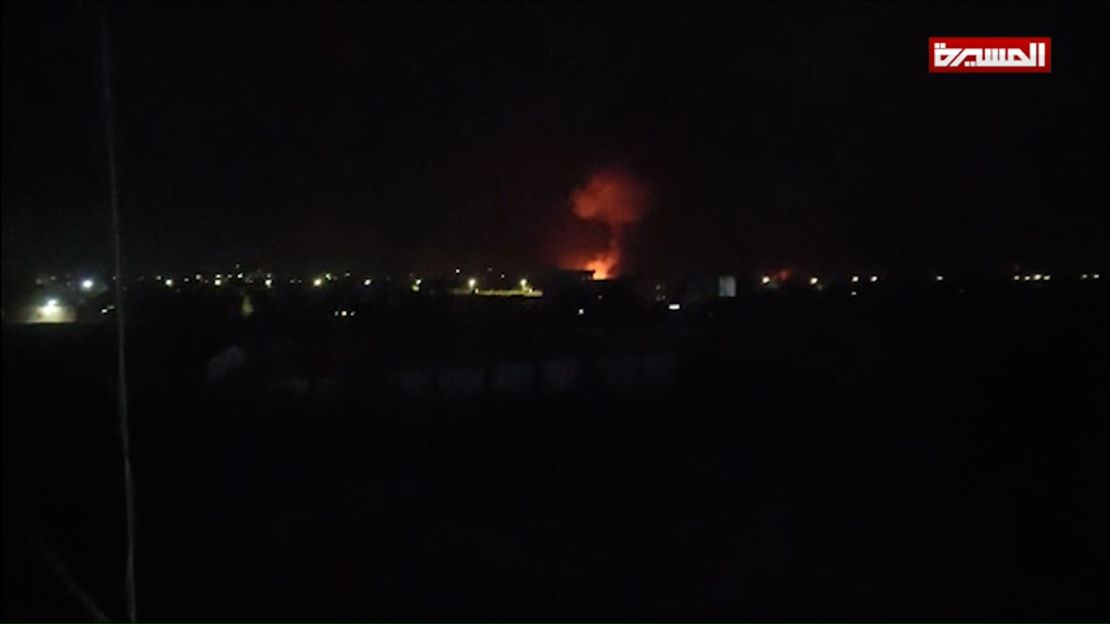
The Houthis — an Iran-backed Shia political and military organization that has been fighting a civil war in Yemen against a coalition backed by Saudi Arabia — have been launching drones and missiles at commercial shipping vessels in the Red Sea for weeks, many of which have been intercepted and shot down by US Navy ships in the area.
The Houthis have said their bombardments are showing solidarity with the Palestinian people, after Israel launched an unrelenting military campaign on Gaza following Hamas’ October 7 terror attacks.
The Houthis have said they will only relent when Israel allows the entry of food and medicine into Gaza; its strikes could be intended to inflict economic pain on Israel’s allies in the hope they will pressure it to cease its military offensive.
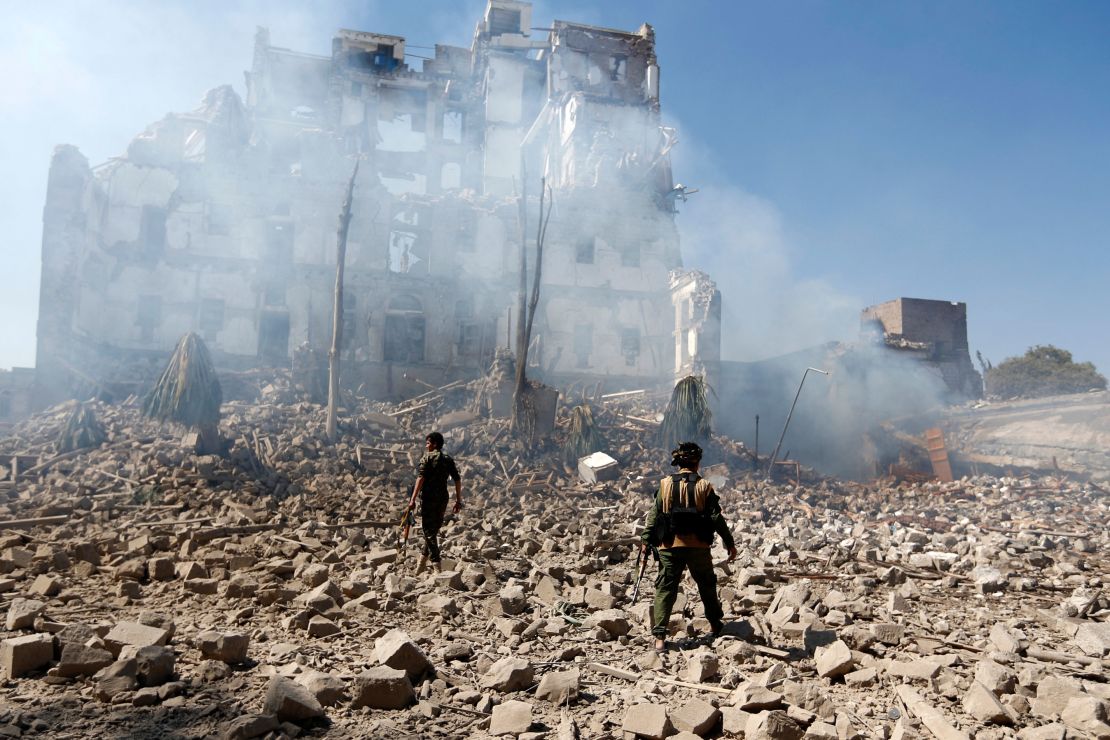
Within Yemen, a yearslong conflict between Houthi forces and the Saudi-backed coalition has plunged the population into a devastating humanitarian crisis marked by famine, economic turmoil and extreme poverty.
Houthi forces stormed the capital Sanaa in 2014, and toppled the internationally recognized and Saudi-backed government, triggering a civil war. The conflict spiraled into a wider war in 2015 when a Saudi-led coalition intervened in an attempt to beat back the Houthis.
The conflict has killed up to 377,000 people, the United Nations Development Programme (UNDP) reported in 2021. More than half of those died from indirect causes associated with the conflict, such as lack of food, water and healthcare.
Pro-Houthi demonstrators gathered in Sanaa on Friday, protesting against the US and UK airstrikes. Some chanted, “God is great, death to America, death to Israel, curse the Jews, victory to Islam.”
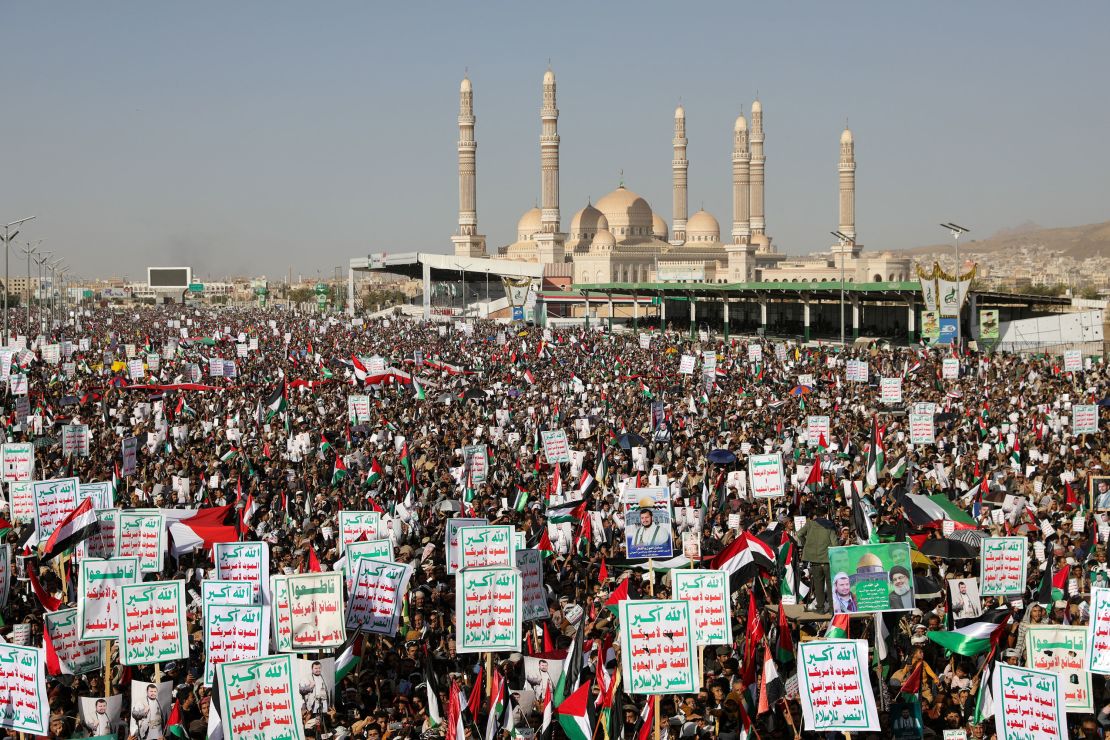
The Houthi attacks on Red Sea shipping on Tuesday marked the final straw that culminated in Biden giving the green light for the US to move forward with Thursday’s strikes, though preparations have been ongoing for some time, a senior US official told CNN.
The strikes come as Secretary of Defense Lloyd Austin remains hospitalized following complications from a surgery for prostate cancer. A senior Defense official said Austin ordered and monitored the strikes in in real-time from the hospital “with a full suite of secure communications.”
Over the course of the past several weeks, Biden has weighed potential strikes against Houthi positions in Yemen against the prospect of an escalating crisis in the Middle East. His underlying hesitancy in ordering direct action has been the potential of getting drawn in more directly to an expanding conflict — a scenario US officials believe could ultimately be Iran’s objective.
But the White House had made clear the repeated Houthi attacks on international shipping lanes in the southern Red Sea were intolerable. The attacks have forced some of the world’s largest shipping companies to avoid the waterway, instead adding thousands of miles to international shipping routes by sailing around the continent of Africa.
Hours before the strike on Thursday, Pentagon spokesman Maj. Gen. Pat Ryder said Iran “has a role to play” in getting the Houthis to stop their “reckless, dangerous, and illegal activity.” If they did not, he said, “there will be consequences.”
The Houthi’s deputy foreign minister, Hussein al-Ezzi, claimed that Yemen was targeted in a “massive aggressive assault.”
In a speech Thursday, Houthi leader Abdul Malek Al-Houthi said that any US attack on Yemen ” will not go unanswered,” cryptically warning that the response will be “much more” than attacking US ships in the sea.
Houthi rebels’ military spokesperson Sare’e on Friday said they would continue their aggression against commercial ships in the Red Sea.
In a statement Friday on social media, Mohammed Ali al-Houthi, the head of the group’s Supreme Revolutionary Committee, said the airstrikes “are barbaric, terrorist, and are a deliberate and unjustified aggression that reflects a brutal psychology.”
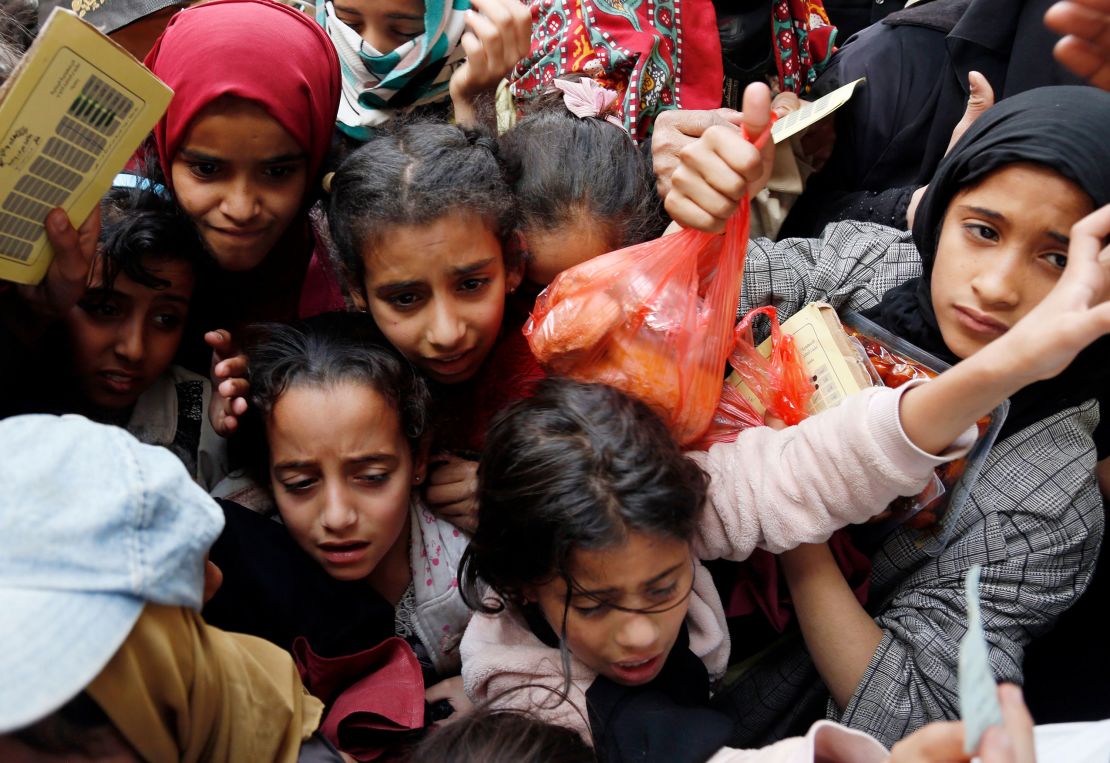
The senior military official said the Pentagon has thus far not seen any signs of retaliatory action by the Houthis as of Thursday night.
A senior US administration official signaled that there could be more action to come against the Houthis.
New explosions were heard in Yemen’s western port city of Hodeidah on Friday, a resident told CNN.
The airport in Hodeidah had been hit in the initial round of strikes early Friday morning. The resident provided CNN a video that showed smoke rising from the direction of the airport.
CNN has reached out to the US Department of Defense about the explosions, and whether there are new strikes in Yemen.
On Thursday, US Secretary of State Antony Blinken warned while traveling in the region that “if it doesn’t stop, there will have to be consequences. And unfortunately, it hasn’t stopped.”
Blinken also said he doesn’t believe the war in Gaza is escalating into a regional conflict, even as he warned of “a lot of danger points.” While in the region, Blinken visited Bahrain, home to the US Naval Forces Central Command and the Navy’s Fifth Fleet.
An important aspect of Blinken’s trip to the Middle East was to tell regional leaders that if US takes military action against the Houthis, it should be seen as defensive, not escalatory, according to a senior State Department official.
On Wednesday, the United Nations Security Council passed a US- and Japan-led resolution condemning “in the strongest terms the at least two dozen Houthi attacks on merchant and commercial vessels since November 19, 2023” and demanding “that the Houthis immediately cease all such attacks.” Eleven countries voted in favor of the resolution. Four abstained, including China and Russia. A Western diplomat told CNN that the US accommodated some of China’s requests on the language of the resolution.
US strikes in Yemen are not unprecedented; according to the Council on Foreign Relations, the US has conducted nearly 400 airstrikes in Yemen since 2002.
In Yemen, officials say they are concerned at what a strike against the Houthis would portend for the region. Declassified US intelligence shows that Iran has been deeply involved in coordinating the Houthi attacks on commercial and merchant ships, including providing information about shipping vessels passing through the waterway.
Among the US’ concerns about taking direct action inside Yemen is also the risk of upsetting a carefully brokered truce in the war in Yemen between the Houthis and Saudi Arabia, which a US official previously told CNN the Biden administration considers one of its most significant foreign policy achievements.
Some American officials feared a direct attack on the Houthis in Yemen would be precisely what the group craved: drawing the US into direct engagement with the Iranian proxy group and potentially committing its forces to a more prolonged conflict.
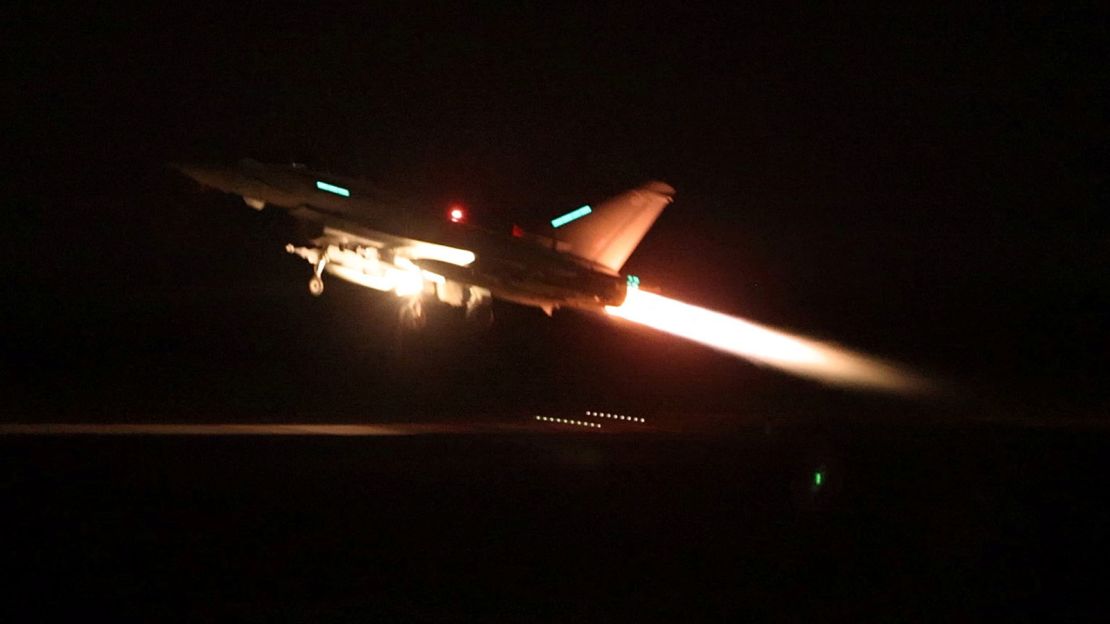
Still, Biden’s attempts at deterrence had done little to prevent the Houthis from continuing their attacks on commercial and merchant ships transiting the Red Sea.
A significant turning point came around New Year’s, when US Navy helicopters shot and sank three Houthi boats in self-defense, killing those aboard. It was the first direct engagement between the US and Houthis since the start of the conflict, and prompted Biden to convene his national security team for a secure briefing call while he was on vacation in the US Virgin Islands.
That joint statement was issued on January 3, saying that the Houthis “will bear the responsibility of the consequences should they continue to threaten lives, the global economy, and free flow of commerce in the region’s critical waterways.”
While not describing the statement as a red line, Biden and his team recognized the language would essentially bind them to a more forceful response should the Houthi attacks continue, which many officials privately believed they would.
Just on Tuesday, the US Navy to shot down 21 missiles and drones fired by the Houthis; culminating on Thursday the fiercest response from the Biden administration since the salvos began.
There have been at least 27 Houthi attacks since November 19. As the US and its allies have been navigating the Houthis’ ongoing attacks, there have also been at least 131 attacks on US and coalition forces in Iraq and Syria since October 17, leading to several strikes on facilities linked to Iran’s Islamic Revolutionary Guard Corps and other proxy forces.
But many of the commercial vessels have had no connection to Israel. Vice Adm. Bradley Cooper, the commander of US Navy Central Command, said last week that the US assesses 55 nations have “direct connections” to the ships that have come under fire.
CNN’s Samantha Waldenberg, Paul W. Murphy, Jonny Hallam, Amy Cassidy, Dalal Mawad and Catherine Nicholls contributed to this report.
CLARIFICATION: This story has been updated to clarify that the USS Florida is a guided-missile submarine.
This story has been updated with additional developments.
US Officials Are Concerned About Split Between Zelensky and Military Chief
by Kyle Anzalone@KyleAnzalone_ #Ukraine #Russia #Zelensky #NATO https://t.co/F4NXP5ylR8 pic.twitter.com/9Gz4wCIevc— Antiwar.com (@Antiwarcom) January 12, 2024
#News #Times #NewsAndTimes #NT #TNT #Israel #World #USA #POTUS #DOJ #FBI #CIA #DIA #ODNI #Mossad #Putin #Russia #GRU #Ukraine #SouthCaucasus #NewAbwehr #Bloggers
Mr. Wray: I think that the FBI should open the new, formal, (non-partisan, needless to say) and in depth… pic.twitter.com/j3Rsoa8RHs— Michael Novakhov (@mikenov) January 12, 2024
#News #Times #NewsAndTimes #NT #TNT #Israel #World #USA #POTUS #DOJ #FBI #CIA #DIA #ODNI #Mossad #Putin #Russia #GRU #Ukraine #SouthCaucasus #NewAbwehr #Bloggers
Mr. Wray: I think that the FBI should open the new, formal, (non-partisan, needless to say) and in depth… pic.twitter.com/DmDf947PxT— Michael Novakhov (@mikenov) January 12, 2024

